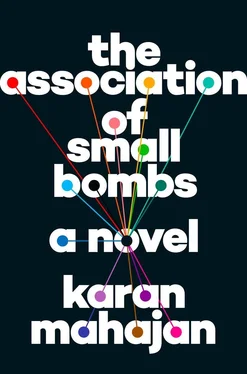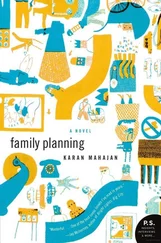“When should we go meet them?” Deepa asked.
“Tomorrow, maybe,” Vikas said, putting his hand in hers.
________
In 2002, the Khuranas had founded the Association of Terror Victims. Over time, they’d come to realize that no one remembered the smaller blasts peppering the history of the country, blasts that vanished into a morgue of memories, overshadowed by bigger events. Therefore, the Khuranas reasoned, the thing to do was to corral the victims of these small blasts and create a group that could lobby for their rights and collectively remember the blasts in which they had lost their relatives or limbs. And why did the Khuranas want the blasts remembered?
Vikas grappled with this privately — was it just a zidd, the demand of a hurt child? Or was there substance to it? He decided it was important to remember in order to keep the past from repeating itself; the country was moving so fast, hurtling so enthusiastically into the future, that people had little idea of how easily everything could be undone. More important, a blast was a political tragedy, an act of war, in which people perished not because of their own mistakes but because of the mistakes of the government. Therefore it held that blast victims should be remembered the way dead soldiers are — Vikas always thought of the names of Indian soldiers who had fought in World War I inscribed in the sandstone biceps of India Gate, a monument the boys had loved, and where he had often taken them for ice cream, the three of them standing on the reddish earth, the boys asking if it was true that the flame inside the gate had been burning for a hundred years and Vikas not knowing the answer — was it possible? Weren’t all sorts of crazy things possible? The boys. How would they have been now, all these years later? Were they still alive somewhere else, being shown around monuments by another set of parents? Had they grown up in this alternative universe where they wore white office shirts and black pants and got ready for work, their adult heads emerging from sweat-stained collars, the shoes on their feet gleaming blackly, Tushar an earnest trainee in some firm, Nakul batting his handsome eyes at some girl who sat at the other end of the office, hiding herself in a giggling group of friends? Sometimes if he closed his eyes he could imagine them as adults and the vision would be so exact, his heart would stop and he would think they were alive or that, by thinking itself, they could be brought back to life and then he would chastise himself for admitting defeat so easily in 1996, for accepting the official cant that the boys were dead instead of brazenly imagining the opposite.
The bomb was so distant now that it did not quite seem real. When he went to Lajpat Nagar these days — and it was often — he tricked himself into believing nothing had happened, and in fact, it wasn’t hard to do: the market had covered over every sign of damage.
Yes, it had never happened. He was forty-seven, successful, with a loving wife and two boys and a daughter. It was the thought of Anusha that jolted him to the present, pricked him with dread. She was the most solid recurring evidence that his life had changed. He hated his daughter. She was cute and round-eyed with flowing streamers of hair and an odd interest in learning how things were made — she was always hugging the walls, asking how they had been poured by workers — but he wondered if she were a little slow. He didn’t want to be near her. Better to stay cramped in the markets of Delhi, among the throbbing crowds, shoulder-to-shoulder with death, with the city, the city that crammed you back into yourself.
Whereas his wife had grieved instantly, he only began to grieve after Anusha was born.
He didn’t see it as grieving, of course. He thought he was taking an interest in the larger world, an interest brought on by the bomb; he thought he was gathering material for a documentary. He filmed it all, became known as the eccentric with the movie camera; people in the markets learned to ignore him after a while.
He was making an encyclopedic film about Delhi, he told himself; capturing the fluctuations in the moods of places. But he was always a little vacant and bored when he carried out these explorations, just as he was vacant at home, draped in his Bhutanese gown.
He was only happy when he was leaving his house, shedding the yoke of this new life that had been thrust upon him.
________
His marriage fell apart. Deepa at first was patient, but then she became shrill in her disappointment. “Not again!” she shouted, confronting his cosmic sadness and anger.
She’d wasted too many years putting up with his depressions: depression over art, his parents, his kids — now a depression over his daughter. As she shouted at him to wake up from his grief, she became nauseated and started burping and went to the sink and retched, but finally all that came were tears, tears ransacking the dignity from her eyes. “Shame on you,” she said, coming back to the drawing room, where Vikas had not moved from the cloth embrace of the broad sofa chair as he read the Hindustan Times , the alpine slopes of hair on his feet visible as they rested on the ground beside the leather slippers. “You’re not a real man.”
Vikas appeared to listen earnestly, attentively, releasing one hand from the paper, which sagged into his lap, the free hand massaging his chin. Then he got up and walked out of the house.
________
Deepa’s anger at her husband grew. She didn’t know what to do. That’s when she visited Mukesh again.
Mukesh, sitting in his office, still dolefully managing construction sites for a living, had been waiting. From behind his glass doors, he had been following the distant eruptions in the Khuranas’ marriage, noting the frequency of Vikas’s exits, his chancy drumming gait as he fled the house, his late returns in the evenings. He knew the marriage was at its end. He was an invigilator of grief — a realist. He knew, unlike the rest of the people in the complex, who confused optimism with high-mindedness, that no matter what Vikas and Deepa did, their marriage could not recover. Nothing did from a bomb.
He had seen the crater left by it when he had gone to the market soon after the blast. It had taken his breath away, given him vertigo, and his mind had circled the ditch with its lacing of trash blended in with the roots of a tree trying desperately to hold on to sinking soil.
When Deepa came to his office one morning, looking frighteningly thin and worked up, he was sympathetic and placid again; he listened to her talk about the construction the neighbors were doing, which disturbed Anusha.
It was in the anger that Mukesh saw the first shoots of life in Deepa.
Then, one day, when Vikas was out, Mukesh went over to the entrance to the house and rang the bell. The dour Nepali servant answered and led him up the cracked stairs into the drawing room. Deepa sat tense in a plain white salwar, clutching her own wrists.
She welcomed him in with a thin smile and offered him tea.
Mukesh was in there for an hour making faces at Anusha, who had come into the room, excited to see her chachu, who gave her dates and candies whenever he saw her. “What a little princess,” he said to her in his disturbingly sexual manner.
“Show uncle your Ajooba dance,” Deepa said.
Anusha was oddly obsessed with this Bachchan movie from the 1990s, and Mukesh, sitting there in his white pants, clapped. There was something perverse about how joyful this child was, he thought. It would have been better if she were morose. Her joy only outlined the tragic background. It brought out the sickness in the yellow walls, the groans emitted by every off-center painting and troubled spot of seepage on the walls.
Читать дальше












